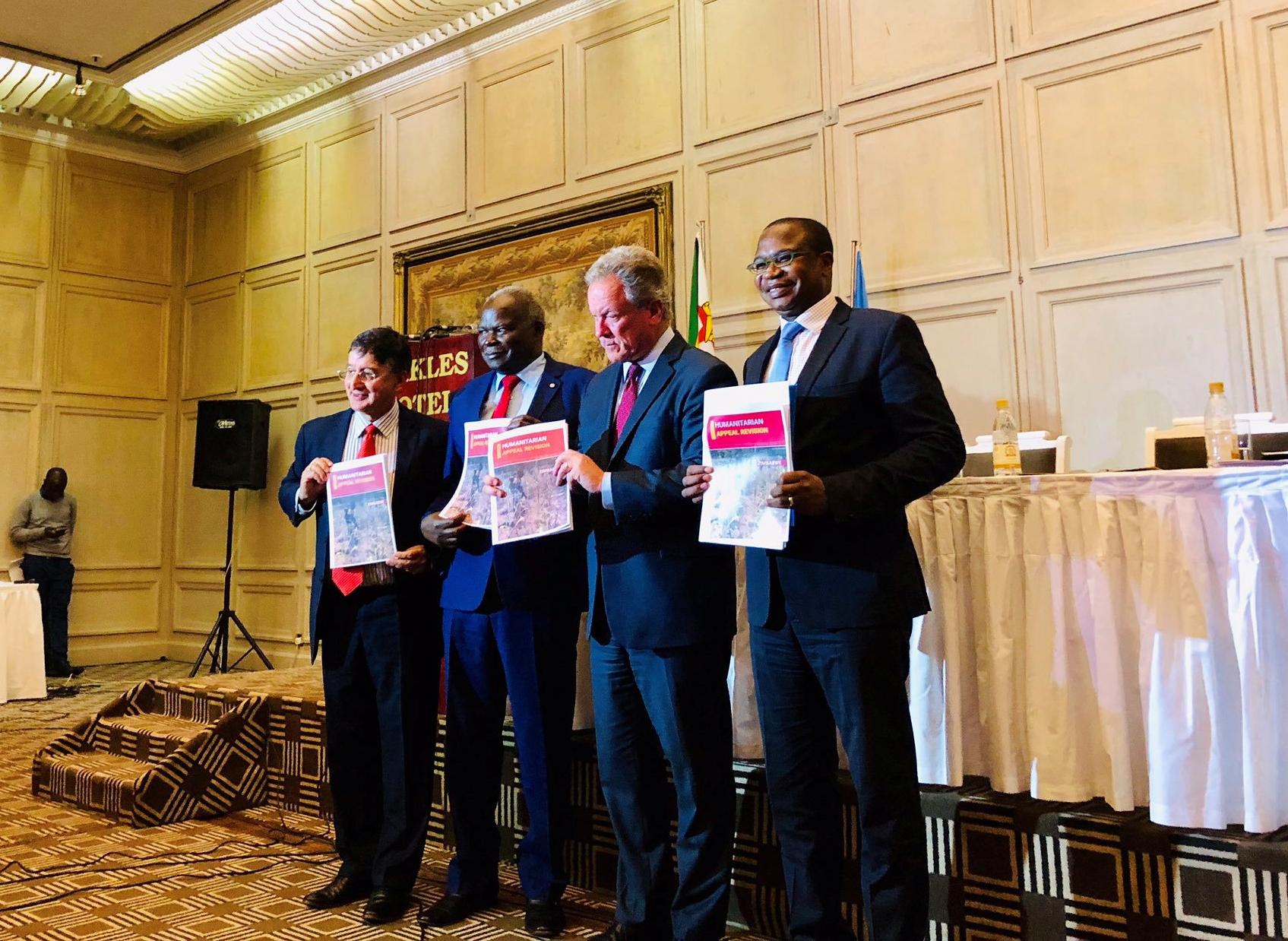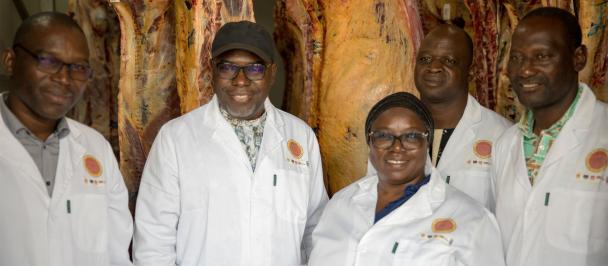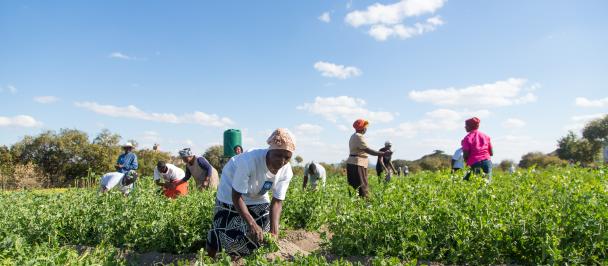(l-r: UN Resident Coordinator, Bishow Parajuli; The Ministry of Local Government, Rural and Urban Development, Hon. July Moyo; World Food Programme Executive Director, David Beasley; Minister of FInance and Economic Development, Hon. Mthuli Ncube)
During the launch of the Revised Zimbabwe Humanitarian Appeal (January 2019 to April 2020) held today, the Government, United Nations, civil society and development partners reinforced their collective commitment to address the increasing humanitarian needs of the vulnerable people negatively impacted by climate and economic shocks. The renewed commitment came as new evidence of increasing vulnerabilities emerged, whereby an estimated 5.5 million people in the rural areas are food insecure, of whom over 3 million people – or 38% of the rural population – are projected to be in need of urgent humanitarian support between the period October to December 2019. Urban vulnerability is also on the rise, with the Ministry of Public Service, Labour and Social Welfare estimating that up to 2.2 million people in urban areas are food insecure. An urban vulnerability assessment is currently ongoing; its findings and recommendations will further inform urban humanitarian actions.
In support of the Government’s efforts, the Revised Zimbabwe Humanitarian Appeal targets the multi-sectoral priority humanitarian needs of 3.7 million vulnerable people, with a total requirement of USD 331.5 million between the period July 2019 to April 2020. The revised appeal prioritizes life-saving support targeting the people most in need, including residual humanitarian needs of cyclone-affected communities.
The launch was jointly hosted by the Government and the UN System in Zimbabwe. David Beasley, Executive Director of the UN World Food Programme (WFP), who is on an official visit to Zimbabwe this week, joined the launch as a special guest. “We must rapidly scale up to meet the urgent food needs of those hardest hit by the economic crisis and the drought. But even as we ramp up to meet those immediate needs, we must work harder on the long-term problems – strengthening those communities that are chronically hungry, so they can better withstand climate shocks and other emergencies,” stressed Beasley.
Highlighting the Government’s ongoing efforts, His Excellency Emmerson Dambudzo Mnangagwa, President of the Republic of Zimbabwe - in a statement - said: “Above all, the Government’s response strategy seeks to protect and empower the vulnerable, principally women, children and the girl-child whose educational prospects must not be diminished by the unfolding humanitarian challenge.”
Recognizing the efforts made by the Government both in addressing the humanitarian challenges faced in country – from the Cyclone Idai response to the current food insecurity situation – and in addressing the macro-economic challenges through the implementation of the Transitional Stabilisation Programme, UN Resident Coordinator, Bishow Parajuli, said: “While efforts are being undertaken to address these extremely complex sets of challenges, there is a moral obligation and an urgency for the international community to lend a hand to support those most in need with humanitarian assistance.”
With the generous support from the development partners and the joint efforts by the humanitarian actors, USD 133 million or 45.5 percent of the priority humanitarian needs have been met between the period January to June 2019, reaching two million women, men and children with critical and life-saving interventions. Close to 1.2 million people received food assistance; 400,000 people received clean water and safe sanitation; 600,000 people received essential health services; and, 16,000 girls and boys received child protection services.
In response to the Revised Zimbabwe Humanitarian Appeal, the Ambassador of the United States of America, H.E. Mr. Brian A. Nichols said: “The United States remains the largest bilateral donor to emergency humanitarian assistance in Zimbabwe and we are proud to be part of a coordinated response to the humanitarian situation. We work closely with the UN and other donors to ensure that as many communities as possible are covered during this challenging time.”
Various other Ambassadors including that of the Republic of South Africa, H.E. Mr. M. N. Mbete; People’s Republic of China, H.E. Mr. Guo Shaochun; Head of Development Cooperation of the European Union Delegation, Ms. Irene Giribaldi; and, Head of Office of the United Kingdom Department of International Development, Ms. Annabel Gerry also delivered solidarity messages in support of the Revised Zimbabwe Humanitarian Appeal.
The launch brought together Cabinet Ministers and senior representatives from Government; diplomatic corps; development and humanitarian partners; civil society; private sector; and the media.
The Revised Zimbabwe Flash Appeal contributes to the 2030 Agenda for Sustainable Development and its 17 goals, by advancing the overarching principle of “leave no one behind” and adopting the humanitarian-development-peace nexus in support of Zimbabwe’s commitments to furthering its human rights and humanitarian obligations.
The UN System, through its 2016-2021 Zimbabwe United Nations Development Assistance Framework, works with various partners to advance democratic, social and economic governance for quality service delivery in health, education, water and sanitation, food and nutrition, gender equality, HIV and AIDS, poverty reduction and resilience building. The United Nations delivers over USD 400 million per annum in various development projects towards inclusive growth and sustainable development.

 Locations
Locations



